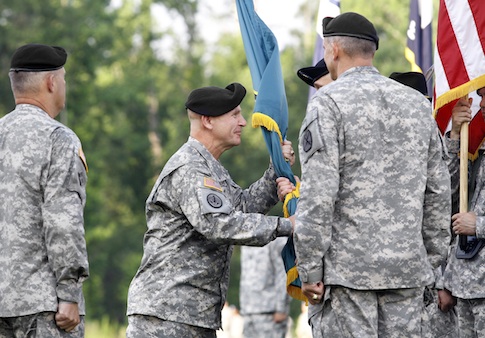An Army general who in the past criticized senior Army leaders for dereliction during the Vietnam War has been promoted and will likely pin on a third star later this year.
Army Maj. Gen. H.R. McMaster, one of the services more innovative leaders, was nominated for the rank of lieutenant general by President Barack Obama, and will become deputy commanding general of the Army Capabilities Integration Center at the Training and Doctrine Command in Langley, Va., Defense Secretary Chuck Hagel announced in a statement Tuesday.
McMaster, 51, is currently commanding general of the Army Maneuver Center of Excellence at Fort Benning, Ga. He is regarded as a protégé of retired Army Gen. David Petraeus, another of the Army’s innovators who helped turn around the war in Iraq by first developing a more flexible counterinsurgency strategy and then applying it to military operations.
"It is heartening to see the Army reward such an extraordinary general officer who is a thought leader and innovator while also demonstrating sheer brilliance as a war time brigade commander," retired Army Gen. Jack Keane, a former Army vice chief, said of the promotion.
McMaster was a captain during the 1991 Persian Gulf War and in 2004 led troops of the 3rd Armored Cavalry that took part in combat operations in Iraq.
The promotion represents the latest step in the rise of McMaster, who many observers felt had derailed his military career with the publication of his 1997 book "Dereliction of Duty: Lyndon Johnson, Robert McNamara, The Joint Chiefs of Staff, and the Lies that Led to Vietnam."
The book, written while McMaster was a major, was an exposé of senior Army leaders regarding their conduct in the Vietnam War. It revealed deceit and double crosses between President Johnson and the Joint Chiefs.
McMaster argued in the book against using the military solely as a political or diplomatic tool, and said instead military forces in conflict should inflict large-scale casualties and widespread damage against enemies to reach specific goals.
After publication, McMaster was protected by Petraeus and other Army leaders and ended up heading a military strategy unit within the U.S. Central Command.
He was passed over for brigadier general in 2006 and 2007, despite his combat duty, raising concerns that senior Army leaders had targeted him for early retirement.
He went to Afghanistan in 2010 to work under Petraeus who took over for Army Gen. Stanley McChrystal.
McMaster, a West Point graduate who has a Ph.D. in American history, wrote in one essay in the early 2000s that "President George W. Bush's approach to the current Iraqi problem stands in stark contrast to LBJ's approach to Vietnam."
"The Bush administration made its case for military action, and, after considerable debate, the American people, through their representatives in Congress, gave approval," he wrote. "The administration also made its case to the United Nations, highlighting the damage that inaction would inflict on prospects for peace in the long term."
McMaster stated in a New York Times op-ed last year that the U.S. military strategy in Iraq and Afghanistan relied too much on high technology and intelligence.
"The lesson: The wars in Iraq and Afghanistan, like all wars, were contests of will that unleashed dynamics that made future events impossible to predict," he stated.
The July 20 article was viewed widely as an Army critique of the Pentagon’s Navy and Air Force oriented Air Sea Battle Concept, developed to counter China’s development of high-tech weapons that will provide Beijing with strategic advantages over U.S. military forces.
